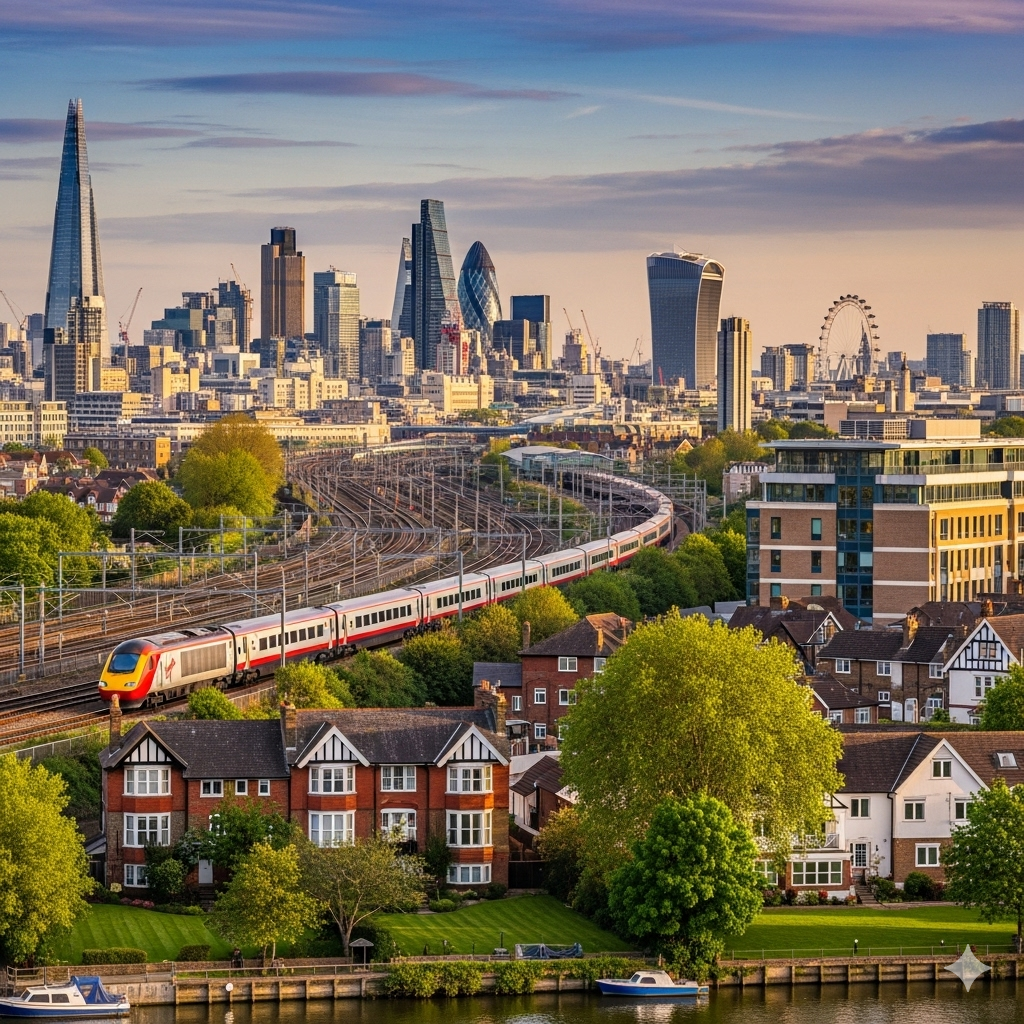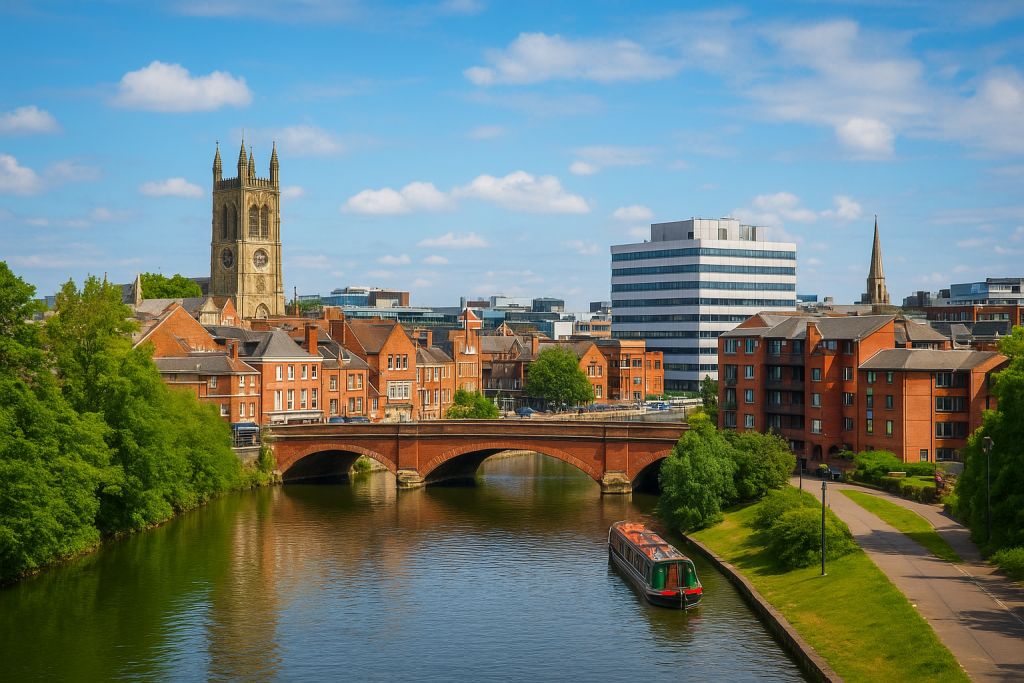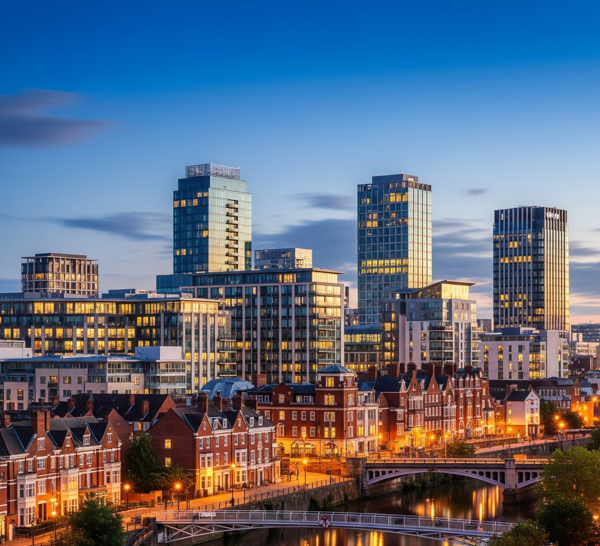
Moving to Reading from London: What You Should Know
Thinking about leaving London for a new start in Reading? You’re not alone. Over the past few years, many Londoners have swapped the capital for this thriving Berkshire town. With more affordable housing, excellent schools, green spaces, and a fast train link into London, Reading is becoming one of the UK’s most attractive commuter hubs.
In this guide, we’ll break down cost of living comparisons, commuting times, neighbourhood options, lifestyle differences, hidden costs, and future developments to help you decide if Reading is right for you.
At a Glance: Reading vs London
- Housing: On average, housing in Reading is 40–50% cheaper than in London
- Commute: Trains from Reading to London Paddington take around 25–30 minutes, with season tickets from ~£5,500/year (National Rail).
- Lifestyle: More space, quieter neighbourhoods, great schools, green parks, and a slower pace of life.
- Trade-offs: Fewer cultural venues and nightlife options than London; commute fatigue if travelling daily.
Why People Move from London to Reading

London’s appeal is undeniable, but with house prices averaging £500k+ and rents climbing year on year, many families and professionals are seeking alternatives. Reading offers:
- Better value for money on housing and rent.
- Strong transport links: Reading is on the Elizabeth Line and Great Western Railway.
- Quality of life: Large green spaces like Forbury Gardens and Thames riverside walks.
- Job opportunities: Reading is home to major employers in tech, finance, and education
- Future developments: Ongoing regeneration projects and infrastructure upgrades are improving connectivity and long-term property values.
Cost of Living: Reading vs London
According to Expatistan, Reading is about 41% cheaper than London overall. Here’s a breakdown:
| Expense | London (avg) | Reading (avg) | Difference |
|---|---|---|---|
| Rent (2-bed flat, central) | £2,400 | £1,200–£1,400 | 45–50% cheaper |
| House price (avg) | £514,000 | £306,000 (ONS) | ~33% cheaper |
| Council Tax (Band D) | £1,900 | £1,800–£2,000 | Slightly lower |
| Utilities (gas, electricity, water) | £150–£200 | £120–£160 | 20–25% cheaper |
| Transport (monthly) | £160–£200 | £70–£90 | 50% cheaper |
| Groceries & dining | Higher | Lower | 10–20% cheaper |
| Childcare (full-time) | £1,400 | £1,000 | 25–30% cheaper |
Takeaway: If you’re renting or buying, Reading will save you thousands per year. However, add in commuting costs if you plan to work in London.
Commuting from Reading to London
Reading is a major transport hub with excellent links:
- Train: Great Western Railway runs fast trains to London Paddington in ~25 minutes. The Elizabeth Line also provides direct services across London, including Canary Wharf and Heathrow.
- Season Tickets: Around £5,500/year for unlimited travel into London zones 1–6 (National Rail).
- Car: ~40 miles to central London; M4 traffic can be unpredictable.
Hidden cost: Daily commuting can add up both financially and in lost time. Hybrid working makes the move far more appealing.
Future improvements: Elizabeth Line extensions and local station upgrades are set to make commuting even faster and more reliable.
Best Neighbourhoods in Reading for London Commuters
| Neighbourhood | Average Property Price | Key Amenities | Suitability |
| Caversham | £450,000–£600,000 | Excellent schools, parks, riverside and village feel | Families |
| Tilehurst | £350,000–£500,000 | Community feel, affordable | First-time buyers/families |
| Earley | £400,000–£550,000 | Good schools, suburban | Families |
| Woodley | £375,000–£520,000 | Parks, schools, shops | Families/commuters |
| Central Reading (RG1) | £300,000–£450,000 | Station, shops, city amenities | Young professionals |
Schools and Family Life

Reading offers top-rated schools:
- Reading School (grammar) and Kendrick School (girls’ grammar).
- Plenty of Ofsted “Good” and “Outstanding” rated primaries and secondaries.
- Family activities: The Oracle shopping centre, Prospect Park, and Thames river walks.
- Catchment information: Reading Borough Council
Lifestyle Differences: Reading vs London
What you gain:
- More living space for less money.
- Access to countryside (Chiltern Hills, Thames Valley).
- Shorter journeys within town.
What you may miss:
- Nightlife, museums, and cultural events.
- Larger variety of jobs across multiple sectors.
Pros & Cons Table:
| Feature | Reading | London |
| Housing cost | Much lower | Very high |
| Commute | Shorter to station, longer to work if commuting | Usually longer in-town |
| Lifestyle | Quieter, green spaces | More amenities, nightlife |
| Schools | Good to Outstanding | Good but crowded |
| Community | Strong local feel | Less intimate neighbourhoods |
Hidden Costs & Trade‑Offs
- Commuting fatigue: Even with quick trains, daily commuting is tiring and costly.
- Council Tax: Reading is comparable to some London boroughs, but varies by band.
- Car ownership: More people drive in Reading; factor in insurance, fuel, and parking.
- Property maintenance: Larger homes outside London often mean bigger bills.
Case Study: A Londoner’s Move to Reading
“We sold our 2-bed flat in East London for £500,000 and bought a 4-bed detached in Caversham for the same price. The kids now walk to an Ofsted ‘Outstanding’ school, and I commute into Paddington 3 days a week. The only downside is the cost of the season ticket and missing some of London’s buzz.” — Sarah, 39, marketing director.
Moving Checklist
- Research neighbourhoods and property prices.
- Compare mortgage options and rental rates.
- Budget for commuting costs and hidden expenses.
- Register with new GP and schools.
- Hire local movers and update addresses.
- Review future developments that may affect your move.
Decision Matrix for Different Personas
| Persona | Recommended Areas | Considerations |
| Young professionals | Central RG1 | Access to station, smaller apartments, social life |
| Families | Caversham, Earley, Woodley | Schools, parks, space |
| Retirees | Tilehurst, Suburbs | Quiet, green, community feel |
FAQs
Is Reading cheaper than London?
Yes. Housing is typically 40–50% cheaper, with lower transport and living costs overall.
How long is the commute from Reading to London?
Around 25–30 minutes by train to London Paddington.
Which areas are best for London commuters?
Caversham, Earley, Woodley, and central Reading near the station.
Is moving to Reading worth it?
If you want more space, lower housing costs, and a family-friendly lifestyle, Reading is a strong choice. Weigh commuting costs and lifestyle trade-offs.
Conclusion
Moving to Reading from London can save you money and improve your quality of life, especially if you work remotely or commute a few days a week. With excellent schools, green spaces, and quick access to London, Reading balances affordability and connectivity.











